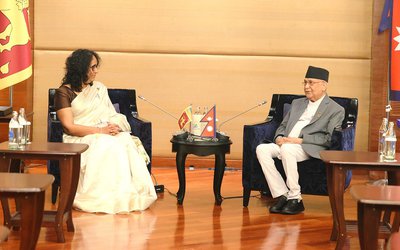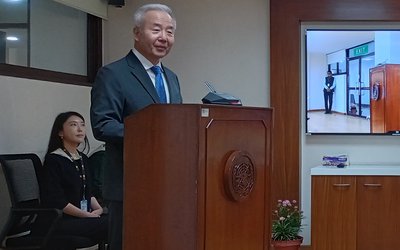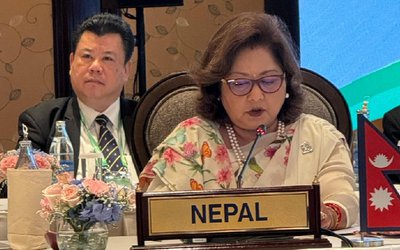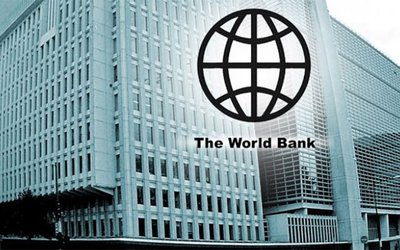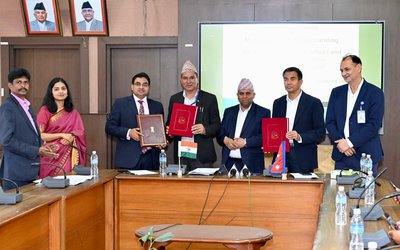In the official parlance of Amargadhi Municipality, the next year is almost never. Locals are fed up. For ten long years, they have been hearing the official promise of ‘next year’ to clean the city, which generates some 5 to 10 tons of garbage daily.
Twelve sweepers and three tractors are assigned for collecting garbage and carrying it to the nearby landfill.
The budget for sanitation and solid waste disposal, according to municipal financial expenditure records, is increasing over the years.
But it is often used up before the completion of the year.
Local people see a dirty practice beneath the dirt strewn around their otherwise beautiful city, known as the gateway to the far-western region, above 2000 meters, some 700 km far west from the capital. Garbage covers drainage and sewerage systems and dirty water flows over the main road, making people forget the city’s beauty.
Their conclusion: A largely invisible chain of corruption eats up funds under garbage and sanitation head.
Unlike construction works, daily garbage collection and disposal are hard to measure. Going by the municipal paperwork and audit reports, the municipality has been getting a clean chit for the job done. The municipality claims it disposes 10 tons of daily garbage.
“We are disposing the solid waste as per our capacity. There is nothing to hide,” executive secretary Gajendra Sharma said, calling attention to growing population and resulting wastes. “We don’t play with the dirt.”
But the ground reality is different, locals said. “You can see the stinking garbage heaps everywhere,” municipal resident Navaraj Bhatta said. “A question naturally springs to our mind: Where does the municipality spend the money?”
Rotting garbage is a human health hazard. The municipality has the authority to spend any money, any time in emergency response to health hazards. In such a response, the municipality uses resources at its will even by avoiding certain legal provisions.
For example, the municipality hires ten laborers to collect the garbage, but pays wages for a hundred. There are three tractors for carrying garbage but the transport cost involves 5 tractors.
One of the urban problems arising out of consumerism is an increased generation of wastes. Unmanaged, wastes create a serious health and environmental hazard.
Poor urban settlements are more affected because of indiscriminate dumping and lack of open space there. Amargadhi seems to be doing better by providing house-to-house waste collection services and final disposal. But the progress is too small to alleviate the real woes of people.
The municipality has limited resources for full and efficient solid waste management services. Corruption has turned the situation from bad to worse.
Legal Provision
Clause 96 of the Local Self Governance Act 1999 stipulates the functions, duties and powers of a municipality. Sub-clause 96 (c) relates these to water resources, environment and sanitation allowing the municipality to carry out and/or manage acts of collection, transportation and disposal of garbage and solid wastes and initiate sanitation programs within it.
One of the primary objectives of the municipality is to keep the city clean. Amargadhi Municipality has been giving priority to garbage management by allocating necessary budgets to perform the job every year.
Under its powers of punishment, the municipality can penalize anyone dumping solid wastes in places other than designated with a fine of up to fifteen thousand rupees. But Amargdhi has failed to take necessary action against those who throw the garbage in the main streets and release sewerage anywhere because it has no designated places.
Municipal Budget
Under the title of sanitation and garbage, a total of Rs. 18, 95,407 (US$25000) was sanctioned in the last three years. Municipal officials completed paperwork to regularize the expenditure without spending any money in real garbage collection.
The municipality sanctioned Rs. 500900.00 (US$ 6000), Rs.600, 000.00 (US$ 8000) and Rs. 713,570.00 (US$ 10000.00) in the fiscal years 2007/08, 2008/09 and 2009/10 respectively under that title. But the money actually went somewhere else.
“We have raised issue with the misuse of resources and rampant of corruption in the municipality by its executive secretary, members of political mechanism and other employees, but nobody is listening to us. A rampant corruption is going on in the municipality in the involvement of so-called all party mechanism and municipal officials,” said Lal Bahadur Jagri, district president of United People’s Forum.
The people’s front has announced a campaign against municipal corruption.
“The corruption in garbage management by the leaders of the all-party mechanism and municipal officials is a heinous crime. They are playing against the public life,” said Jagri. “We want a probe on this matter by the Commission for the Investigation of Abuse of Authority.”
Such disenchantment is growing. “We cover our nose before the piles of stinking garbage dumped in the main streets and other parts of the municipality. Our health is at risk,” said Bhatta.
Although the pressure against corruption in the municipality is building, leaders of political mechanism have already distributed one million rupees (US$ 14,000) sanctioned for the construction of sewerage and garbage collection.
“It is unfortunate that the paper work has already been presented and the bill has already been cleared by the municipality,” said Jagri. “How they spent so much money in just three months is a matter of concern. I am confident that there is an irregularity in the expenditure.”
Jagri has already filed a complaint to chief district officer.
Other municipal residents nurse similar grudges. “This is one of the dirtiest municipalities in the country. There is stinking garbage in Kirtipur,Tufandanda, Bagbazar and other areas. Where does the budget go?” asked a local businessman.
Local people also blame municipal officials for misuse of money sanctioned for sanitation and garbage management. According to them, all the executive officers start spending the money allocated for sanitation and garbage as soon as they take charge of the executive secretary. “The budget allocated for sanitation and garbage has already been finished now,” said a municipal official.
“If municipality grossly neglects human health, what other things can one expect from it? We are witnessing health problems including chest infection, diarrhea and typhoid,” said Bhatta.
As a small municipality with moderate population, Amargadhi could manage its garbage through allocated resources if the funds were not to fill the pockets of individuals.
Members of political mechanism and municipal officials have been awarding the tender for garbage collection by evading the process. Soon after the release of the budget, leaders of major parties divide it among themselves. In municipal records, paper documents are there to legalize the spending, but the situation at the ground level is different because nothing much gets done.
Public Private Partnership
“We are tired of listening to complaints one after another. We are now planning to hand over garbage management function to the private sector,” said Gajendra Sharma, executive secretary of Amargadhi Municipality.
Earlier, Industry and Commerce Association of Dadeldhura expressed its willingness to get involved in garbage management but the process was suspended because of political disputes.
“If political parties decide the issue on consensus, we are ready to take charge of garbage management,” said Prakash Bahadur Saud, president of Dadeldhura District Industry and Commerce Association. “The garbage management is not an issue at all. We can handle the issue if we were given the responsibility.”
Although the municipality announced a tender bid asking private parties to submit proposals, it received no bid. “Since our association is not a contractor body, we did not submit the tender,” said Saud. “Those who hold the licenses do not carry brooms.”
Padma Joshi of Tufandanda said the negligence of the municipality was responsible for the garbage crisis. “Without political consensus, it is impossible to manage the garbage. It is also a weakness of local administration and political parties to helplessly watch the inaction of the municipality,” he said.
Municipal employees and members of political mechanism, however, reject charges as politically guided. “The budget allocated for sanitation and garbage management is properly used. Of course, some of the money went to pay the office rent and salary of the sweepers,” said Lal Bahadur Saud, head of administrative division of the municipality. “The municipality has been doing its best to make the city clean and healthy.”
Local business leader Binod Joshi demands probe on the municipal expenditure. He complains nobody knows about how even the one million rupees provided by Dadeldhura district was spent.
“You cannot accuse that there is corruption in the expenses of sanitation and garbage management without valid evidence,” said Ananda Keshri Pokharel, Local Development Official at Dadeldhura District Development Committee. But Pokharel expresses his helplessness about the fate of the million-rupee budget provided to the municipality. “It is the municipality’s job to spend the money in accordance with its plan. I cannot say more than this,” said Pokharel.
Despite pressure from media, intellectuals and businessmen, the municipality’s garbage remains unmanaged. As per the policy of the Ministry of Local Development, Amargadhi Municipality is also planning to hand over garbage collection to the private sector.
Growing Urbanization
In Nepal, urbanization is increasing at an alarming rate. Amargadhi is not an exception. In the process of urbanization, the issue of garbage management obviously comes to the fore. According to a study, conducted by Practical Action, Best Practices on Solid Waste Management on Nepalese Cities, solid waste management was a big challenge to all established and emerging towns in 2009.
When there is corruption, the situation will definitely go from bad to worse. Amargadhi Municipality’s experiences have shown that municipal corruption reaches beyond capital expenditure to even the service sectors, unless something is done to stop the dirty game.
This is the seventh of nine investigative stories on politics of local bodies supported by The Asia Foundation. The views expressed by the Author do not necessarily reflect those of The Foundation or founderPlease type your text here. Public Private Partnership
“We are tired of listening to complaints one after another. We are now planning to hand over garbage management function to the private sector,” said Gajendra Sharma, executive secretary of Amargadhi Municipality.
Earlier, Industry and Commerce Association of Dadeldhura expressed its willingness to get involved in garbage management but the process was suspended because of political disputes.
“If political parties decide the issue on consensus, we are ready to take charge of garbage management,” said Prakash Bahadur Saud, president of Dadeldhura District Industry and Commerce Association. “The garbage management is not an issue at all. We can handle the issue if we were given the responsibility.”
Although the municipality announced a tender bid asking private parties to submit proposals, it received no bid. “Since our association is not a contractor body, we did not submit the tender,” said Saud. “Those who hold the licenses do not carry brooms.”
Padma Joshi of Tufandanda said the negligence of the municipality was responsible for the garbage crisis. “Without political consensus, it is impossible to manage the garbage. It is also a weakness of local administration and political parties to helplessly watch the inaction of the municipality,” he said.
Municipal employees and members of political mechanism, however, reject charges as politically guided. “The budget allocated for sanitation and garbage management is properly used. Of course, some of the money went to pay the office rent and salary of the sweepers,” said Lal Bahadur Saud, head of administrative division of the municipality. “The municipality has been doing its best to make the city clean and healthy.”
Local business leader Binod Joshi demands probe on the municipal expenditure. He complains nobody knows about how even the one million rupees provided by Dadeldhura district was spent.
“You cannot accuse that there is corruption in the expenses of sanitation and garbage management without valid evidence,” said Ananda Keshri Pokharel, Local Development Official at Dadeldhura District Development Committee. But Pokharel expresses his helplessness about the fate of the million-rupee budget provided to the municipality. “It is the municipality’s job to spend the money in accordance with its plan. I cannot say more than this,” said Pokharel.
Despite pressure from media, intellectuals and businessmen, the municipality’s garbage remains unmanaged. As per the policy of the Ministry of Local Development, Amargadhi Municipality is also planning to hand over garbage collection to the private sector.
Growing Urbanization
In Nepal, urbanization is increasing at an alarming rate. Amargadhi is not an exception. In the process of urbanization, the issue of garbage management obviously comes to the fore. According to a study, conducted by Practical Action, Best Practices on Solid Waste Management on Nepalese Cities, solid waste management was a big challenge to all established and emerging towns in 2009.
When there is corruption, the situation will definitely go from bad to worse. Amargadhi Municipality’s experiences have shown that municipal corruption reaches beyond capital expenditure to even the service sectors, unless something is done to stop the dirty game.
This is the seventh of nine investigative stories on politics of local bodies supported by The Asia Foundation. The views expressed by the Author do not necessarily reflect those of The Foundation or founderPlease type your text here.

